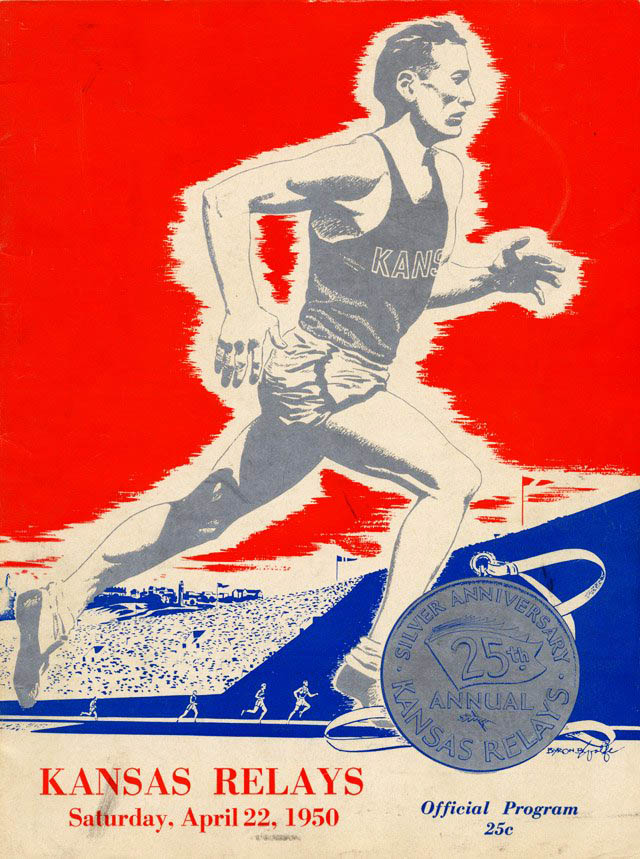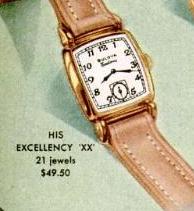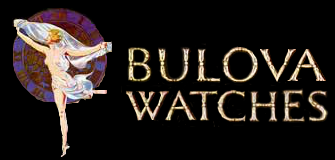This watch was one of the "1st Place" Awards given to those atheletes who competed in the 1950 "Kansas Relays" Track & Field event held at the University of Kansas, USA.
As you can see the watch is a 1950 His Excellency XX model. The really unique thing about these special models is that they have KANSAS RELAY in the University of Kansas Red and Blue in lieu of the numbers on the watch. The "50" that replaces the 12 on the dial indicates the year the games were held and the athelete won the award.
As this is probably Pre-redial's... these watches more than likely were special ordered from Bulova for these events though we have no documentation showing this speculation.
The watch has been given a new period gold plated bracelet and has been paired with an original set of matching "His Excellency" boxes that were issued with the 1950 His Excellency line.
Here is the information for the "Kansas Relays" as well as cover for the 1950 Kansas Relays program. As you can see from the program the games were held on April 22, 1950 and they were the 25th Anniversary of the event! That's pretty interesting to know when this watch must have been presented to someone and it's possible the 25th Anniversary had something to do with the presentation.
Kansas Relays History
The concept of a major track and field meet at the University of Kansas was first espoused by legendary Kansas football coach John Outland. Outland grew up in the East and became heavily involved with the Penn Relays. It was Outland's urging to then athletics director and basketball coach Phog Allen that a major Midwest competition could be successful.
With the construction of Memorial Stadium in 1921, equipped with a quarter-mile track, plans were put in motion for the event. On April 20, 1923, the first Kansas Relays under the direction of Outland, Allen and Kansas track coach Karl Schlademan, was conducted. More than 600 athletes from across the nation competed. Outland became known as the "Father of the Kansas Relays."
The first decade of the Kansas Relays saw the participation of such outstanding performers as Tom Poor, Jim Bausch and Glenn Cunningham of Kansas, Ed Weir of Nebraska, Jack Elder of Notre Dame and Tom Churchill of Oklahoma.
Poor won the first Relays high jump at 6-0 1/4, and later placed fourth at the 1924 Olympics in Paris, France. Weir, a Cornhusker football star, set a world record (15.0) in the 120 high hurdles. Churchill and Bausch, also football stars, won consecutive decathlons in 1928-29 and 1931-32, respectively. Cunningham dominated the distance events in the mid-1930s, winning the mile run in 1934-35, and the two-mile in 1932-33-36. Bausch and Cunningham both competed in the 1932 Los Angeles Olympics, with Bausch winning the gold in the decathlon.
In 1936 Glen Morris of the Denver Athletic Club broke the American record in the decathlon with 7,576 points, defeating Kansas Olympian Clyde Coffman and Chicago's Jay Berwanger, college football's first Heisman Trophy winner.
The early days of the Relays brought some of the top names in refereeing and officiating. Dr. James Naismith, known as the father of basketball, Kansas basketball All-American Adolph Rupp, Notre Dame football coach Knute Rockne and famed Kansas and Michigan football coach Fielding Yost appeared.
The 1940s ushered in the retirement of Cunningham who ran his last Relays in 1940. World War II made a major impact on the nation and caused the cancellation of the track event from 1943-45. The Relays were rekindled with fire in 1946 as Harrison Dillard of tiny Baldwin-Wallace College (Ohio) won the 120 high hurdles in 1946 and 1948, with the latter being a world record.

The Relays were in full stride in the 1950s with the presence of Kansas head coach Bill Easton, who came from Drake in 1948. It was the beginning of the Jayhawks' dominance in the conference and Midwest relays circuit. Two top Kansas athletes came in the form of weightman Al Oerter and distance ace Wes Santee. Oerter, who went on to win four Olympic golds, won consecutive Relays shot put titles in 1956-57-58. Santee, who followed in Cunningham's footsteps, became the only athlete to win the most outstanding performer award at the Kansas, Drake and Texas Relays. Santee won the Kansas Relays title in 1952 and 1954, and registered the second fastest American time ever in the mile in 1954.

In reply to Works for me. His Excellency by mybulova_admin
In reply to As I've seen a few more by plainsmen
In reply to Can do...what title did you by mybulova_admin
"Bulova Track & Field Champion Watches"
Make it more generic. The "Champion Watch" was taken from the last article in this reply. As we find more maybe we can add them to the feature. I know another track & field event the "Drake Relays" did the same thing. Maybe if we get more info we can add them as well.
Also add this to it boss:
Upon some further investigation it looks like Bulova watches were given to the winners of several other Track and Field Events, such as the "Drake Relays"
This article from a previous winner is really cool:
ARTICLE SHOWING 1953 BULOVA AS A PRIZE FOR WINNING TRACK MEET.

"Not only were the Drake Relays one of the most prestigious meets in the nation, it was set to be televised before a national audience for the first time in the event’s history. To up the ante, the sprint medley relay was the opening race of the meet.
In reply to "Bulova Track & Field by plainsmen
Another great article about the Drake Relay Champion Watch. Apparently these things were a HUGE deal back in the day.
In reply to As I've seen a few more by plainsmen
In reply to Hi Plaismen, Watched this by DennisVA
In reply to I actually snagged this guy by plainsmen
